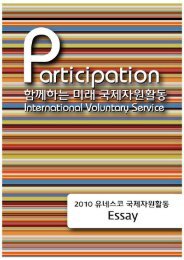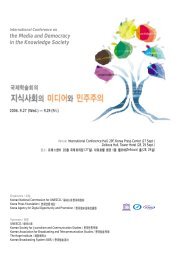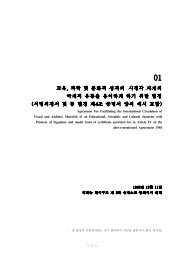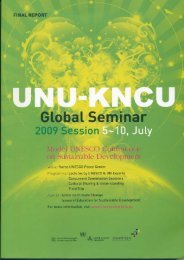íëìë³´ë2012문íì ë°ì ë¼ì´ëí ì´ë¸.pdf - ì ë¤ì¤ì½íêµììí
íëìë³´ë2012문íì ë°ì ë¼ì´ëí ì´ë¸.pdf - ì ë¤ì¤ì½íêµììí
íëìë³´ë2012문íì ë°ì ë¼ì´ëí ì´ë¸.pdf - ì ë¤ì¤ì½íêµììí
You also want an ePaper? Increase the reach of your titles
YUMPU automatically turns print PDFs into web optimized ePapers that Google loves.
them toward cooperative behaviors if the motive levels do not coincide with the construal<br />
levels as demonstrated in the study above.<br />
Therefore, the possibility of reducing poverty starts with the provision of specific aid in the<br />
short run, alongside a “nudge” stimulus that can produce immediate effects according to the<br />
low-level construals, which will be gradually moved to higher-level construals by providing<br />
the poor with abstract and future-oriented motivations.<br />
A study that examined saving behavior also demonstrated the fact that incentives to make<br />
savings must be provided according to individual construal levels. The study shows that for<br />
high-level construers, specific goals lead to savings success because they perceived them to<br />
be more important. In contrast, specific goals are perceived as more difficult by low-level<br />
construers, resulting in lower savings success (Ulkumen & Cheema, 2011). As people's<br />
mindset on goals determines effects, people may consider goals to be important or<br />
unimportant depending on their construal levels, and the success will differ accordingly.<br />
Therefore, high-level construers must be provided with incentives that encourage savings<br />
with proposed target amount, while the same will not work for the poor, with low-level<br />
construals. The psychological aspect must be taken into account in formulating policies for<br />
the poor.<br />
III. Culture is Important Again<br />
1) Cultural Model for Overcoming Poverty<br />
The importance of negotiation in the formulation of development strategies can be found<br />
from “Getting More: How to Negotiate to Achieve Your Goals,” written by the world’s<br />
leading negotiation expert, Diamond (2011). According to him, the first step of negotiation is<br />
to understand and sympathize with the other party. A true negotiation is “understanding the<br />
other party's emotions and perceptions, and gradually approach negotiations after creating a<br />
favorable atmosphere.” This implies that the method of “understanding” in cultural relativism<br />
is the starting point in attaining one’s goals. The same is true of aid or relief policies for poor<br />
countries. How the assistance is perceived by the poor is a crucial factor.<br />
The cultural approach to poverty respects cultural diversity, thereby enhancing the cultural<br />
identity of local communities. This in turn increases the autonomous decision-making process<br />
of the poor. In addition, individuals gain competence with the development of unique cultural<br />
resources and actively engage in communication within their communities, thus enhancing<br />
relatedness. Autonomy, competence and relatedness lead to increased self-determination, and<br />
increased self-determination eventually leads to the creation of social capital, self-control,
















